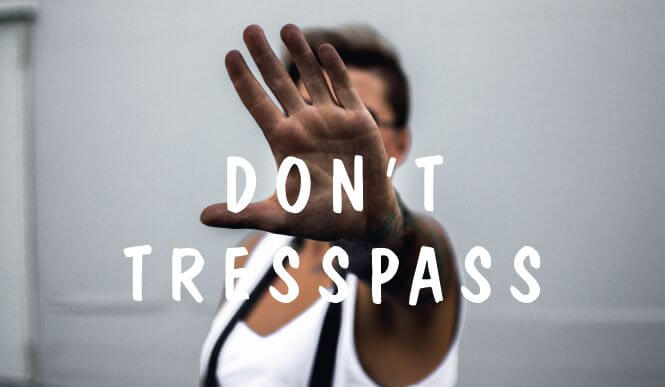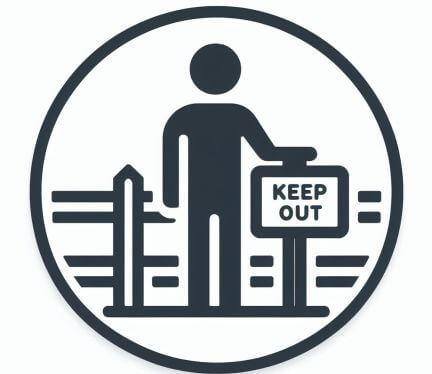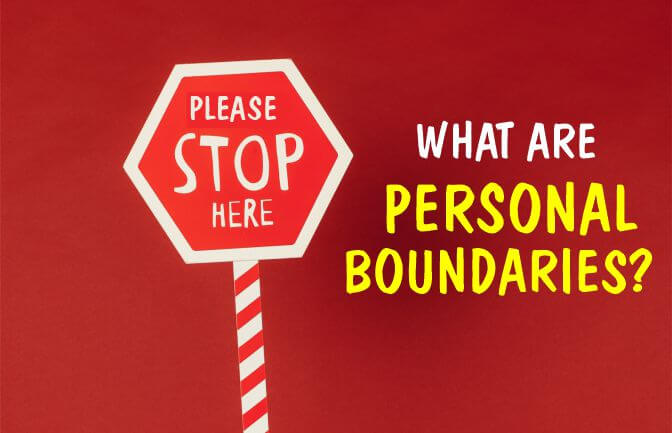Last updated on October 11th, 2024 at 02:00 pm
Understand why you must set personal boundaries and healthy limits to enjoy sanity, and emotional health for positive relationships.
Establishing healthy personal boundaries is important for maintaining healthy relationships and being respected.
These boundaries serve as guidelines that determine how you want to be treated, what you consider acceptable behavior, and how much you are willing to give in any given situation.
As an introverted person, setting personal boundaries comes naturally to me as I set them early enough around people.
But that can’t be said for others. What are personal boundaries?
By setting clear limits, you can protect your emotional and physical well-being, prevent burnout, and promote respectful and balanced relationships.
In this article, we have put together everything you need to know about personal boundaries – the importance, types, examples, and practical tips on how to establish and maintain healthy limits in various areas of life.
Table of Contents
- What are Personal Boundaries?
- Importance of Personal Boundaries
- Types of Personal Boundaries
- Types Of Personal Boundaries Based on Degree of Permeability
- How to Set and Maintain Personal Boundaries
- Consequences of Weak Personal Boundaries
- Examples of whom and Places you Can Set Personal Borders for
- Challenges Affecting Setting Personal Boundaries
- How do You Know You Have Personal Boundary Issues?
- Relationship between Personal Boundaries, Self-esteem, and Identity
- How Much Boundary is Enough?
- Watch this Video on Porous, Healthy and Rigid Boundaries
- Frequently Asked Questions
- Final Words from The Conducts of Life
What are Personal Boundaries?

Personal Boundaries Definition
Personal boundaries are the psychological, emotional, and physical limits we establish to protect ourselves from being manipulated, used, or violated by others.
These boundaries define your selfhood and individuality and self-respect, shaping the ways you interact with the world and those around you.
Personal boundaries can manifest in various forms, such as the need for personal space, the articulation of emotional needs, and the establishment of limits on acceptable behaviour.
Understanding and respecting personal boundaries is important for maintaining healthy relationships, sustaining self-esteem, and safeguarding emotional well-being.
Setting and communicating these boundaries is an essential aspect of self-care and personal empowerment.
A lot can go wrong over a poor or weak boundary giving rise to a lot of misunderstandings and misinterpretations.
Importance of Personal Boundaries
The importance of personal boundaries lies in their ability to:
- Protect Emotional Well-being: Boundaries help prevent emotional manipulation and maintain a sense of self-worth and emotional stability.
- Sustain Healthy Relationships: By clearly defining acceptable behaviour, boundaries promote mutual respect and understanding in relationships.
- Empowerment and Autonomy: Setting boundaries empowers individuals to assert their needs and desires, encouraging a sense of personal agency and autonomy.
- Stress Reduction: Healthy boundaries reduce stress by preventing overcommitment and allowing individuals to prioritize self-care.
- Self-respect: Boundaries communicate self-respect and help individuals uphold their values and beliefs in their interactions with others.
Now that we have talked about what personal boundaries are and their importance, let’s examine the types of physical limits there are:
Types of Personal Boundaries

1. Physical Boundaries
Physical boundaries are the limits and personal space you establish to maintain physical comfort and autonomy in your interactions with others.
These boundaries control how close you are to others and touches deemed acceptable.
This influences how you engage in physical contact and navigate personal spaces.
By establishing and respecting physical boundaries, you can safeguard your physical comfort, assert your autonomy, and promote a sense of safety and well-being in your interactions.
2. Emotional Boundaries
Emotional boundaries are the limits you set to protect your emotions and maintain a healthy level of emotional intimacy in relationships.
These boundaries define the extent to which you are willing to share your feelings, thoughts, and experiences with others.
It also determines the level of emotional support you are comfortable providing.
By establishing and respecting emotional boundaries, you can safeguard your emotional well-being, maintain a sense of autonomy in your relationships, and promote healthy emotional connections.
3. Mental Boundaries
Mental boundaries are the psychological limits you set to protect your thoughts, beliefs, and values.
Mental boundaries define the extent to which you are open to receiving and processing external influences, such as opinions, information, and ideas.
By establishing and respecting this boundary, you can preserve your cognitive autonomy, and maintain a sense of clarity and focus.
It can also help protect your mental well-being.
Mental boundaries are crucial for promoting critical thinking, self-awareness, and personal growth while preventing cognitive overload and the erosion of your core beliefs and values.
4. Material Boundaries
Material boundaries are the limits you set regarding your possessions, resources, and finances.
These boundaries define how you interact with others in terms of sharing, lending, and borrowing material items.
By establishing material boundaries, you can protect your belongings, maintain financial stability, and uphold your autonomy in material exchanges.
This may involve setting limits on lending money or possessions, establishing clear expectations around sharing personal items, and respecting the boundaries of others regarding their material possessions.
5. Time Boundaries
Time boundaries involve the limits you set on how you allocate time and energy.
These define the extent to which you commit to activities, responsibilities, and relationships.
By establishing time boundaries, you prioritize self-care, maintain a healthy work-life balance, and prevent burnout.
This may involve saying no to commitments that overwhelm you, setting aside dedicated time for rest, and establishing clear boundaries around work hours and personal time.
Types Of Personal Boundaries Based on Degree of Permeability

Rigid boundaries, porous boundaries, and flexible/healthy boundaries are different types of personal boundaries characterized by varying degrees of permeability and adaptability:
Let’s take a closer look:
1. Rigid Boundaries
Rigid boundaries are characterized by being overly strict and inflexible.
If you have rigid boundaries may have difficulty in forming close relationships and may be resistant to change or new experiences.
You will often keep others at a distance and have a hard time asking for help or showing vulnerability.
2. Porous Boundaries
Porous boundaries are a lack of clear separation between oneself and others.
Individuals with porous boundaries may have difficulty saying no, may feel responsible for the emotions and actions of others, and may share personal information too readily.
This can lead to feelings of being overwhelmed and a lack of personal autonomy.
3. Flexible/Healthy Boundaries
Flexible or healthy boundaries are characterized by a balanced approach to personal limits.
Individuals with healthy boundaries can assert their needs, communicate clearly, and maintain a sense of autonomy while also being open to forming meaningful connections with others.
They can adapt to different situations and relationships while still prioritizing their well-being and values.
4. Sexual Boundaries
People set sexual boundaries because of one reason or another. People could be in a relationship but decide not to engage in an intimate love affair.
It’s either they are not ready for such or their interest is not ripe enough. Declaring this ahead of time saves future bickering and misunderstandings.
Example: Some people have it as a boundary not to have sex on the first date. They know their reasons and can’t violate them.
Read about how to establish healthy sexual boundaries with your spouse.
Religious Boundaries
Religious boundaries protect you as you believe what you want. I for one do not discuss religion with strangers.
The reason is that people are easily offended when it comes to religious matters. You don’t want to immerse yourself in bickering that is not worth it.
Example: Emotions fly off the handle when there is an argument and you never can tell what would happen. I draw a very conspicuous line on religious matters.
Financial Boundaries
People set financial boundaries so they don’t spend more than what is necessary to sustain them.
You don’t want to go buying everything you can because the money is available. You want to have a strict policy on how you make your money and spend it.
Example: Preparing your food and not eating out because you are on a budget as it is less expensive.
How to Set and Maintain Personal Boundaries

To set and establish personal boundaries and be a master at it, you need to be competent in the following areas:
1. Self-awareness
Setting personal boundaries begins with self-knowledge and understanding.
You need to understand your own needs, values, and limits to establish effective boundaries.
This involves recognizing personal triggers, understanding emotional and physical comfort levels, and identifying what is acceptable and unacceptable in your interactions with others.
Self-awareness allows you to discern when your boundaries are being encroached upon and empowers you to take appropriate action to protect your well-being and autonomy in various situations.
2. Clear Communication
Certainly! Clear communication is essential for setting personal borders.
You don’t want to have people speculating on what might offend you.
Early on, you should make your boundaries known to save yourself from unhealthy explanations later.
You must properly and clearly articulate your boundaries to others, expressing your needs, limits, and expectations directly and respectfully.
This involves clearly stating what is acceptable and unacceptable in your communication, as well as communicating the consequences of boundary violations.
Clear communication sustains mutual understanding and respect, minimizing misunderstandings and conflicts while promoting healthy and respectful relationships.
3. Assertiveness
Of course, assertiveness plays a crucial role in setting and maintaining individual boundaries.
You need to assert yourself confidently and respectfully when your boundaries are being challenged or violated.
This involves standing up for your needs and limits, expressing your feelings and concerns assertively, and refusing to compromise on your boundaries.
Assertiveness empowers you to protect your well-being and autonomy, while also promoting mutual respect and understanding in your interactions with others.
4. Consistency
Consistency is key to maintaining personal boundaries or any boundaries for that matter.
You must uphold your boundaries consistently across different situations and with various individuals.
This involves enforcing boundaries without exception, regardless of the circumstances or the people involved.
Consistency reinforces the message that your boundaries are non-negotiable, promoting respect for personal limits and expectations.
By maintaining consistency, you establish a clear standard for your interactions and minimize the risk of boundary violations, ultimately promoting healthier and more respectful relationships.
Related: How To Establish Boundaries With Your Partner
Consequences of Weak Personal Boundaries

1. Stress and Burnout
Weak boundaries can lead to chronic stress and eventual burnout.
When you consistently allow your boundaries to be violated, you may find yourself overstretched, overwhelmed, and unable to prioritize self-care.
This can result in heightened stress levels, emotional exhaustion, and a diminished capacity to cope with challenges.
2. Resentment
Individuals with weak boundaries may experience feelings of resentment towards others.
By consistently disregarding your own needs and allowing others to overstep your boundaries, you develop a sense of bitterness and frustration.
This resentment can strain relationships and lead to emotional distress.
3. Unhealthy Relationships
Weak personal borders can contribute to the development of unhealthy relationships.
You may attract or tolerate people who exhibit manipulative or controlling behaviour, as your lack of boundaries make you more susceptible to exploitation.
This can lead to codependent dynamics, emotional abuse, and a lack of mutual respect within relationships.
Examples of whom and Places you Can Set Personal Borders for
Boundaries are set anywhere you find yourself including in the bush. You have to maintain a safe distance from wild animals when you see them.
You are not alone in your environment so should always look out for other people’s boundaries to respect including animals and nature.
However, boundaries are not limited to the above examples, denying someone you hardly know a hug, not comfortable giving out your contact to people you don’t trust, and not having someone in your home when you are not there are other examples.
Boundaries can be set with:
- Family
- Friends
- Strangers
- Relationships
- Workplace
- Environment
The key is knowing when to open up for close interaction and when to activate the boundaries.
Three basic types of personal boundaries hinge on how willing a person is to open himself to others.
Challenges Affecting Setting Personal Boundaries
Some factors affect the establishment of individual boundaries, making it difficult or even unappealing.
1. Social and Cultural Influences
Social and cultural norms can present challenges in setting your boundaries.
You may feel pressure to conform to societal expectations, which can conflict with your boundaries.
Cultural attitudes toward assertiveness, emotional expression, and interpersonal relationships can also impact your ability to establish and maintain healthy boundaries.
2. Fear of Conflict
The fear of conflict can hinder you from setting and enforcing your boundaries.
You might worry about upsetting others, damaging relationships, or facing confrontation.
This fear can lead to a reluctance to assert your needs and limits, resulting in boundary violations and a compromise of your well-being.
3. Guilt and Shame
Feelings of guilt and shame can arise when you attempt to set boundaries, especially if you have been conditioned to prioritize the needs of others over your own.
You may feel guilty for asserting yourself or setting limits, fearing that you are being selfish or unreasonable.
This internal conflict can make it challenging for you to uphold your boundaries and prioritize your well-being.
4. Setting
Boundaries vary based on the setting; one may be more open with friends but more reserved in a professional environment.
5. Age
Personal boundaries become more relevant as individuals mature, with teenagers often needing guidance in understanding and establishing boundaries.
6. Gender
Women may establish more boundaries due to vulnerability, aiding in self-protection and deterring potential threats.
7. Personality Type
Introverts typically have stricter boundaries, preferring limited interaction, while extroverts may have more flexible boundaries due to their sociable nature.
Related: How To Set Family Boundaries
How do You Know You Have Personal Boundary Issues?

Sometimes you don’t know if you need when to activate boundaries or not, and other times you are oblivious to what it is.
The following indicates you have boundary issues.
- You hardly can say ‘no’, decline an offer, or voice out your discomfort.
- People take advantage of you or play mind games with your emotions to have their way.
- You constantly bear people’s burdens, cleaning up their messes while feeling used.
- You constantly find yourself in avoidable useless arguments that leave you drained and in regrets afterward.
- You are offended every other time by either your partner, a friend, or a co-worker over the same matter.
- Seeing yourself engaged in things you detest.
- Spending too much time defending yourself over situations that are not your fault.
Suggested: Avoiding Manipulation and Possessiveness
Relationship between Personal Boundaries, Self-esteem, and Identity
Personal boundaries are a direct influence on self-esteem. It’s only someone with healthy self-esteem who would set boundaries for their good.
You must be self-aware, emotionally intelligent, and have healthy self-worth to know who, and what you don’t need in your space.
Being high in self-esteem helps one block unwanted interactions, arguments, emotions, and touches that could arise when people are close enough.
Your sense of self, meaning, and how you view yourself will determine the value and response you elicit from others around you.
I noticed that whenever I am dressed in dress shoes, a pair of trousers, and a shirt tucked in, I elicit a different kind of respect and approach from people.
This alone sets a kind of boundary that determines how people address you and their opinions about you.
When you don’t care about your identity, you will attract low-quality people around you because they don’t see any boundary which serves as a guideline as to how they behave around you.
Related: The Pitfalls Of An Abrasive Personality
How Much Boundary is Enough?

It is difficult to say how many boundaries you would need in each situation.
However, your needs would help you determine if you would go all out and have a rigid boundary or loosen up.
If the situation poses a serious threat to your well-being, locking up entirely is preferable, giving no space for any eventuality.
For instance, if you are always locked in a draining argument with a fellow when you open up, it’s in good taste to tighten the boundary so there is no starting a situation in the first place.
However, some situations require a relaxed boundary because no serious threat is detected.
My friends usually know when I am neck-deep in my study room, however, some stubborn ones would want a tete-a-tete with me and won’t give heed to my boundaries.
I open up so we can throw banters for some minutes which would also lighten me before burying my life again into the business of the day.
So, how much boundary depends on the situation. The key is to know when to loosen up and when to tighten your boundaries.
Watch this Video on Porous, Healthy and Rigid Boundaries

Frequently Asked Questions
What are personal boundaries?
Other personal borders. They are the limits you set to protect your physical, emotional, and mental well-being in interactions with others.
Why are personal boundaries important?
Because they are important for maintaining self-respect, sustaining healthy relationships, and safeguarding emotional well-being.
How can I establish healthy personal boundaries?
Self-awareness, clear communication, assertiveness, and consistency are key in setting and maintaining healthy individual boundaries.
What are the consequences of weak personal boundaries?
Weak personal boundaries can lead to stress, resentment, and unhealthy relationships, impacting emotional well-being and overall quality of life.
Final Words from The Conducts of Life
Understanding, establishing, and maintaining personal boundaries is fundamental to leading a healthy and balanced life.
By recognizing and respecting your personal needs and limits, you establish clear guidelines for how you wish to interact with others.
It is through open and honest communication that you can protect your physical, emotional, intellectual, and sexual well-being.
While personal boundaries may face challenges, the benefits that come with maintaining them are invaluable.
By actively practicing the art of personal boundaries, you can sustain self-esteem, promote healthier relationships, and ultimately cultivate a more fulfilling and contented life.
SOURCES:
- Types of boundaries and why you need them
- Relationship And Personal Boundaries
- What Kind Of Boundary Do You Need To Set?
- Rigid, Diffuse and Flexible Boundaries
- https://www.thoughtfull.world/mental-health/what-are-personal-boundaries
- https://www.drtracyhutchinson.com/what-are-personal-boundaries-and-why-are-they-important/
- https://www.mindtools.com/anenol6/managing-your-boundaries
Pious Clements is the insightful voice behind "The Conducts of Life" blog, where he writes about life ethics, self-development, life mastery, and the dynamics of people and society.
With a profound understanding of human behaviuor and societal dynamics, Pious offers thought-provoking perspectives on ethical living and personal growth.
Through engaging narratives and astute observations, he inspires readers to navigate life's complexities with wisdom and integrity, encouraging a deeper understanding of the human experience and our place within society.



